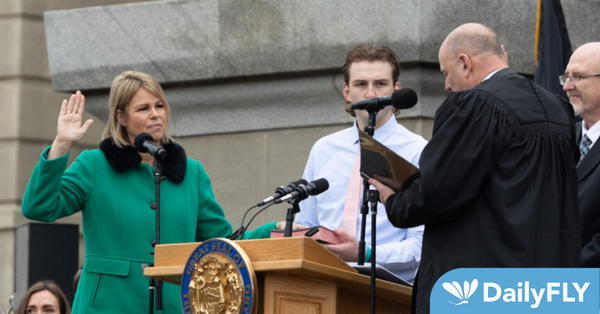Wednesday was Debbie Critchfield’s 23rd day on the job as Idaho Superintendent of Public Instruction. She guided the Idaho Legislature’s Joint Finance-Appropriations Committee through the 2024 public school budget request, promising to prioritize students, teachers, communities and achievement as she oversees the state’s public school system and budget.
Historically, the public school budget request is one of the closest watched budget hearings of the year because of the amount of money involved and the number of students and teachers the money supports. It is the second largest budget in the state, behind Medicaid.
Critchfield devoted two hours to presenting the nearly $2.5 billion general fund budget request for the 2024 budget year. At the beginning, Critchfield asked legislators to think about education in terms of the students, teachers and parents involved, not the system as a whole.
“This is an important moment for me, and I am excited to present and to be an advocate for the public school’s budget for the state of Idaho,” Critchfield, a Republican from Oakley, told legislators.
“We want to focus on achievement and core skills and delivering a return on investment for Idaho communities, businesses and taxpayers.” Critchfield added.
Money from the seven public school budgets will provide funding for Idaho’s 115 school districts and 70 charter schools. From kindergarten through 12th grade, there are about 319,000 students receiving a tuition-free, public school education in Idaho, Critchfield said.
Highlights of Idaho’s 2024 public school budget proposals
The public school budgets are split between seven divisions: operations, administrators, teachers, children’s programs, facilities, central services and educational services for the blind and deaf.
Each budget will be presented and voted on separately by JFAC and the Idaho House and Senate.
Overall, the 2024 public school budget request is for about $2.5 billion in state general fund spending.
- Gov. Brad Little recommends a 2.8% increase in general fund spending compared to the current budget, and an additional $330 million in dedicated funding.
- The State Department of Education requests an 8% increase in general fund spending.
- One of Little’s top priorities is a $145 million proposal to increase state funding for teacher pay, which Little’s staff said would be equivalent to a $6,359 raise for each teacher.
- Critchfield is requesting $15 million for content and curriculum, to restore funding that was removed during the pandemic, and another $13.4 million for behavioral health, literacy and math programs, for a total of $28.4 million.
- Critchfield is also requesting $9 million to restore professional development training for teachers related to student learning, mentoring and collaboration. The funding was originally reduced in the 2022 fiscal year in anticipation of a slumping economy that would necessitate budget cuts.
- Critchfield has also asked for $2.9 million to provide training related to educating students with dyslexia.
On the first day of the 2023 legislative session, Critchfield voiced support for Little’s budget request and education proposals from the State of the State address, which Critchfield said demonstrated Little’s commitment to education.
Critchfield is new to the role of superintendent of public instruction, but she has experience with public school education in Idaho. She previously served as president of the Idaho State Board of Education. She was first appointed to the State Board of Education in 2014 and served until 2021, when she devoted herself to running for office. Before that, Critchfield served on the school board for Cassia County School District and worked for the district.
The first JFAC budget presentations for newly elected statewide public officials are always a little awkward. The state runs on a fiscal year calendar that runs from July 1 to June 30 every year, so new elected officials like Critchfield are taking office during the middle of the budget year.
The timing of the budget-setting process also means new public officials present a budget request developed by their predecessor. State department and agency budget proposals are due by Sept. 1 each year, and new state officials weren’t elected until Nov. 8 and weren’t sworn in until Jan. 2. That means Critchfield presented a budget request largely developed by her predecessor, former Superintendent of Public Instruction Sherri Ybarra and Ybarra’s State Department of Education advisors.
Critchfield’s preparation and the level of detail she included in her presentation stood in contrast to Ybarra’s first budget hearing in 2015, when Ybarra devoted just 17 minutes to her budget presentation and left JFAC members searching for answers.
During Wednesday’s hearing, legislators had more than a dozen questions for Critchfield, asking about federal COVID-19 relief funds, funding for classroom technology, health insurance benefit costs, the state’s math initiative, student achievement and test results, and Little’s $145 million proposal to increase state funding for teacher pay.
“Some of these (budget requests) are quite large,” Rep. Josh Tanner, R-Eagle, told Critchfield. “Have you had a chance to go through and actually evaluate some of these? These tend to keep growing, and at our current time we are seeing some of our assessments coming back from our students actually dropping, whether it’s in English, math. A lot of the blame has been on COVID. But is there a way to look and see which ones are not being effective and look at potentially cutting or potentially removing some of these items from our budget?”
Critchfield told Tanner she has gone through many programs on a deep level, but has not had time to review them all in her first 23 days.
“As a signal, that’s how we will look at budgeting for next year,” Critchfield told Tanner.
JFAC members did not take any votes or make any decisions about the 2024 public school budget Wednesday. Those decisions will take place after JFAC transitions from budget hearings to budget setting beginning in late February.

















